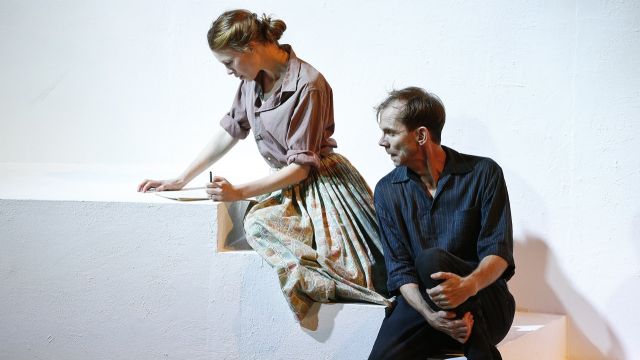Hydra
A married war correspondent and a talented young writer meet, scandalously fall in love, and escape to the Greek island of Hydra, where they rule over the growing Bohemian community of expats. They both want to write – and only write – but the reality of requiring an income drags them in different directions.
Based on the true story of George Johnston and Charmian Clift, writer Sue Smith has crafted the tumultuous tragedy from the perspective of their eldest son, Martin and realised it in a one-act play on a wonderfully stark set.
State Theatre regular Nathan O’Keefe narrates the story, his childhood observations recalled as a grown man – mostly: there’s a pleasing ambiguity in how he moves in and out of the diegesis and action.
Anna McGahan is captivating as Charmian – the lover, mother, writer, wife, editor, pragmatist and prop for George’s stubborn drunk. She shifts effortlessly through her youthful idealism to adult reality, not just telling but living her tragic story.
Bryan Probets’ Johnston is an emotional alcoholic, scarily fierce in both writing and relationships with everyone around him: family, friends and strangers. His writer’s block seems to clear only when faced with his own mortality – and with these edges of realisation, Probets gives us quiet moments of tenderness and love. But these are quickly discarded with the violence of his language, presenting a writer seemingly unable to discern between passion, anger and frustration.

Director Sam Strong has brought together a cast that has great chemistry: there’s a genuine excitement of the unknown with their friends Vic and Ursula (Hugh Parker and Tiffany Lyndall-Knight), starting a new life in a strange land. The stage work is seamless and the movement in time and place simple, subtle and successful. It looks beautiful: designer Vilma Mattila’s organic curves are disrupted by three doorways and a necklace of sharp, regular steps, brilliantly lit by Nigel Levings’ lighting design, which raises the oh so bright sun and cool blue moon.
The dialogue is often poetry – breathing life into the writer’s own words when spoken on the stage, but there is a lot of exposition too, sometimes incongruous punctuation for the drama. On the surface, this is a familiar story, of the deconstruction of a love affair, and on that level this doesn’t offer anything new. The story and its characters are allowed to indulge in their arrogance and entitlement, become unlikeable, and there is seemingly no hunger for justice in their reward and redemption.
Woven into this story are threads of the Icarus story – of someone who creates a way out of his prison – but alarmingly, the remainder of that story isn’t told and related to until much later, which makes for an uneven fabric and foreshadowing.
Where Hydra succeeds more is in the exploration of how people are remembered: the role of Charmian in George’s success – at the cost of her own - starts as an undertone but becomes the main theme. This is a quiet examination of anonymous sacrifice, where it’s offered in love, but whilst acknowledged in part by the artist himself, isn’t properly recognised by those who admire his work.
For those like Icarus, who have soared and fallen, their cynicism may grate against the sporadic self-indulgence of Hydra. But for aspiring artists, with the dream of being able to make a living through their own creations, this will resonate, inspire – and be a warning.
Mark Wickett
Photographer: Jeff Busby
Subscribe to our E-Newsletter, buy our latest print edition or find a Performing Arts book at Book Nook.

